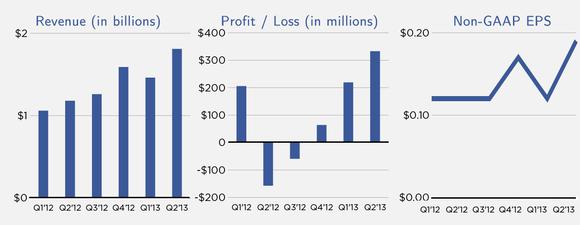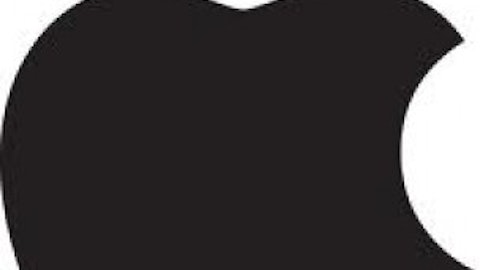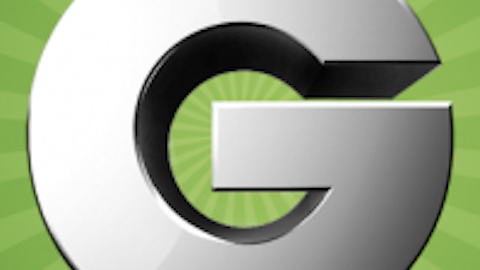
Shares jumped 30% in less than 24 hours, after Facebook announced revenue for the second quarter of 2013 was up 53%, taking market capitalization to $82 billion. This, however, may be just the beginning. As Facebook Inc (NASDAQ:FB) continues growing its revenue and user base, emphasizes mobile growth and experiences with different monetization models, I believe the biggest social network in the world will surpass $100 billion in market capitalization in less than a year. Here’s why I think so.
Mobile isn’t a threat for Facebook: it’s an opportunity
One of the reasons most investors were afraid of investing in Facebook Inc (NASDAQ:FB) was the increase in mobile traffic. As Facebook became a “mobile” application, many analysts predicted that advertisement revenue could fall below expectations since Facebook did not seem to have a clear idea on how to monetize its mobile application.
Luckily for Facebook, as more users log into their accounts from mobile platforms, the average amount of time they spend using Facebook also increases. This is because mobile users seem to be more engaged. The more time spent on Facebook, the more exposure to advertisements, and the more opportunities Facebook Inc (NASDAQ:FB) has to make money. That’s exactly what is happening now and what is driving revenue and income growth: the ratio of daily actives to monthly actives was 61% in the last quarter, and as high as 70% in the U.S. alone. In this way, investors and analysts regarded mobile as a negative catalyst, where in fact it is a positive catalyst.

Reference: Tech Crunch
As a matter of fact, not all IT companies can say mobile is good for their business. Facebook is the exception, not the rule. Even Google Inc (NASDAQ:GOOG) is finding mobile monetization hard.
The latest earnings call showed its cost-per-click fell by 6% compared to a year earlier (analysts were looking for a 3% drop) due to the increased usage of mobile phones and tablets. Most likely, Google Inc (NASDAQ:GOOG) will have to make it harder for the advertiser to choose only-PC ads, or enforce combined rates for PCs, tablets and mobiles. This could cause some initial disappointment among advertisers, and could be an opportunity for Facebook.
1 million advertisers and growing
This is a historical milestone that should be reviewed in detail. Facebook recently reached more than 1 million advertisers, well-diversified in terms of geography, location and type of business. Considering that Facebook’s quarter revenue totaled $1.46 billion, roughly speaking, each advertiser spends $1460 per quarter (I’m assuming the only source of revenue is ads, for simplicity).
But that’s set to grow. First of all, the ratio of advertisement content to non-advertisement content in the news feed is still low, at 1-to-20. I believe users can stand seeing ads more often.
This is not the only growth driver, though. As I mentioned in an early note in my personal blog, US social media advertisement is set to explode in the next few years, and eventually other technologically savvy economies will follow the same trend. According to an interesting study by BIA/Kelsey, by 2017 $11 billion will be spent on social advertisements per year, which is $4.7 billion more than last year. Most of this growth will happen in the mobile arena, where Facebook’s users engagement is higher.
Even though social advertisement is still a young market that only represents 1% to 10% of ad budgets for most advertisers, Facebook managed to register 1 million advertisers. Imagine how this figure will look in the next few years. As more advertisers join social networks and as each average advertiser increases its social ads budget, Facebook revenue could double once more in less than a year.
Worth more than a $100 billion?
Yes! If Facebook Inc (NASDAQ:FB) keeps a similar growth rate for the next 3 years, it will quadruple its revenue base per quarter with no difficulty, making a potential $5.84 billion per quarter. The percentage of revenue that is converted to income is roughly 23%, but as Facebook gets more advertisers under its network, it could add a moderate premium to improve margins or use bargaining power with its content delivery networks or infrastructure providers.
Assume a 30% margin. That’s about $1.752 billion in income per quarter, or roughly speaking, $7 billion in income per year. Therefore, to be worth 100 billion, Facebook would only need to be trading at a PE multiple of 14 by 2016.
But Morningstar mentions that the average P/E ratio of this Industry is 36.8! Since Google Inc (NASDAQ:GOOG) is also an advertising company, if you assume the same P/E ratio for Facebook (27x), you obtain a $189 billion market capitalization.
As a matter of fact, even in the worse case scenario, if Facebook only manages to double its revenue within two years and keeps the same margin, assuming a 36.8x multiple, Facebook would be worth $96 billion in market capitalization.
But Facebook isn’t only about advertisement! Just to mention a few examples, the company’s gaming revenue was also up by a significant 11%. And Facebook has more than $9.6 billion in cash (according to Morningstar) to spend in acquisitions of early stars, some of which could become cash cows in time.
For example, in late April Facebook revealed it had acquired Parse, in an attempt to get into a new business segment: paid tools for mobile app developers, a market that itself could be worth as much as $100 billion itself by 2015, according to Research2Guidance.
Finally, you also have Instagram, which recently launched its video service to compete against Google’s Youtube, which generates 10% of Google’s revenue. This could start producing revenue within the next two years, if Facebook succeeds at monetizing the service. In this way, even under a pessimistic scenario, Facebook seems more than well prepared to surpass the $100 billion market cap milestone within the next two years.
Zynga will benefit too
Zynga Inc (NASDAQ:ZNGA) clearly has a lot to win from Facebook’s growth. The company recently suffered a massive decrease in market capitalization, after new management announced it will not be pursuing an online gambling license in the U.S. any more and will focus on free social games instead.
The upside is that Zynga Inc (NASDAQ:ZNGA) uses Facebook for a lot of its gaming traffic, and Facebook has proven once more after the latest earnings call, that it can continue increasing its user base. Facebook’s daily average users, as a percentage of monthly active users, rose to 61% in the second quarter. Of course, Zynga Inc (NASDAQ:ZNGA) has more issues, like poor monetization, that need to be taken under consideration when making an investment thesis.
Not everyone is happy
Finally, Facebook seems to be entering businesses where Google is the main competitor: the introduction of video sharing to Instagram is a potential treat to Youtube. As a matter of fact, in the past three days, Google lost 2.8% in share price. As Facebook increases its income and launches new businesses that leverage its social network, I expect a strong negative correlation between shares of Facebook and Google to start. It seems that the market has finally woke up and saluted the birth of a new IT giant.
The article Why Facebook Is Worth More Than $100 Billion originally appeared on Fool.com and is written by Adrian Campos.
Adrian Campos has no position in any stocks mentioned. The Motley Fool recommends Facebook and Google. The Motley Fool owns shares of Facebook and Google. Adrian is a member of The Motley Fool Blog Network — entries represent the personal opinion of the blogger and are not formally edited.
Copyright © 1995 – 2013 The Motley Fool, LLC. All rights reserved. The Motley Fool has a disclosure policy.





